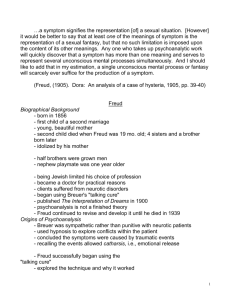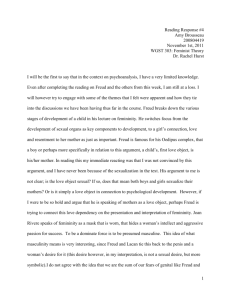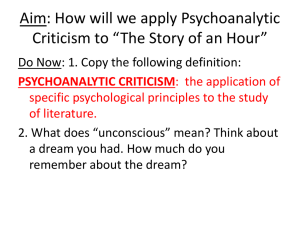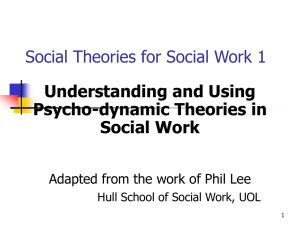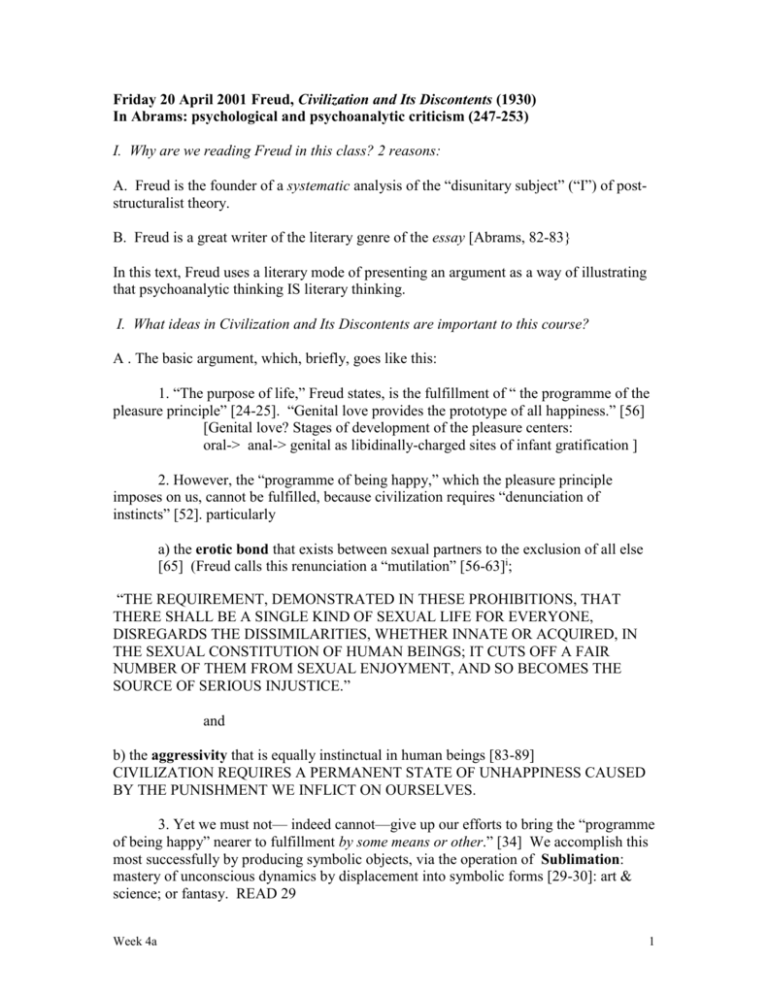
Friday 20 April 2001 Freud, Civilization and Its Discontents (1930)
In Abrams: psychological and psychoanalytic criticism (247-253)
I. Why are we reading Freud in this class? 2 reasons:
A. Freud is the founder of a systematic analysis of the “disunitary subject” (“I”) of poststructuralist theory.
B. Freud is a great writer of the literary genre of the essay [Abrams, 82-83}
In this text, Freud uses a literary mode of presenting an argument as a way of illustrating
that psychoanalytic thinking IS literary thinking.
I. What ideas in Civilization and Its Discontents are important to this course?
A . The basic argument, which, briefly, goes like this:
1. “The purpose of life,” Freud states, is the fulfillment of “ the programme of the
pleasure principle” [24-25]. “Genital love provides the prototype of all happiness.” [56]
[Genital love? Stages of development of the pleasure centers:
oral-> anal-> genital as libidinally-charged sites of infant gratification ]
2. However, the “programme of being happy,” which the pleasure principle
imposes on us, cannot be fulfilled, because civilization requires “denunciation of
instincts” [52]. particularly
a) the erotic bond that exists between sexual partners to the exclusion of all else
[65] (Freud calls this renunciation a “mutilation” [56-63]i;
“THE REQUIREMENT, DEMONSTRATED IN THESE PROHIBITIONS, THAT
THERE SHALL BE A SINGLE KIND OF SEXUAL LIFE FOR EVERYONE,
DISREGARDS THE DISSIMILARITIES, WHETHER INNATE OR ACQUIRED, IN
THE SEXUAL CONSTITUTION OF HUMAN BEINGS; IT CUTS OFF A FAIR
NUMBER OF THEM FROM SEXUAL ENJOYMENT, AND SO BECOMES THE
SOURCE OF SERIOUS INJUSTICE.”
and
b) the aggressivity that is equally instinctual in human beings [83-89]
CIVILIZATION REQUIRES A PERMANENT STATE OF UNHAPPINESS CAUSED
BY THE PUNISHMENT WE INFLICT ON OURSELVES.
3. Yet we must not— indeed cannot—give up our efforts to bring the “programme
of being happy” nearer to fulfillment by some means or other.” [34] We accomplish this
most successfully by producing symbolic objects, via the operation of Sublimation:
mastery of unconscious dynamics by displacement into symbolic forms [29-30]: art &
science; or fantasy. READ 29
Week 4a
1
TO ILLUSTRATE, LET US APPLY THIS CONCEPT TO THE QUESTIONS OF THE
WEEK THAT DEAL WITH MERMAIDS—TSE RECREATEWS THE FANTASY IN
WHICH PRUFROCK EXPRESSES HIS WISHFUL IMPULSES:
“I think it was mentioned in lecture that the mermaids could be an idealized form of
women in Prufrock's mind. How can that be when supposedly the mermaid don't have
means of reproduction? …why would something that's not fertile be Prufrock's ideal?”
“…At the end of [Prufrock] there is a complicated image of the mermaids ‘combing the
white hair of the waves blown back.’ Its stream of conscious correlation with the
character's concern with his own hair in the preceding lines ‘Shall I part my hair from
behind,’ may be a departure from the classical icon of the mermaid (usually pictured with
mirror and comb)as a symbol of female vanity and deceitful allure, in suggesting that
perhaps males too are weak, socially vulnerable. Yet, what is Eliot, or Prufrock's
appraisal of this weakness, this anxiety of vanity? Is Eliot mediating a common ground of
sexual discontent and anxiety between the sexes, as one might argue he does in The
Waste Land with the transgendered Teresias figure?…”
Week 4a
2
B. Freud is the founder of a systematic analysis of the “disunitary subject” (“I”) of poststructuralist theory. The fundamentals of psychoanalytic theory: 3
1. Mental life is tripartite, consisting of :
Unconscious; id: the domain of instinctual passions and aims, which are “stronger than
reasonable interests” [69]ii ; its energy is called “libido” (Latin, “desire,” “pleasure”)
Ego: the domain of “reasonableness”; the domain of mediation between the aims of
libido to achieve pleasure and the aims of the super-ego to punish the desire for pleasure.
The ego is also the objectified form of self-understanding, which believes itself to be
whole, individual and unitary (the “I”). It is consequently the site of neurotic suffering:
“acting out” unconscious wishes for both satisfaction and punishment. (“Neurotic
symptoms are…substitutive satisfactions for unfulfilled sexual wishes”; and “conceal a
quota of unconscious sense of guilt, which in its turn fortifies the symptoms by making
use of them as a punishment” [103])
Super-ego: self-prohibiting register of consciousness, artefact of earliest socialization of
instinctive impulses: the means by which human instinct of aggressivity is “introjected,”
turned inward, and acts out on the self its aims of inflicting punishment on the Other
2. The human individual is the site of an lifelong contest, conducted in the unconscious,
between Eros & Thanatos, the two aims of the pleasure-seeking libido: for sexual
gratification and for expression of aggression. Neurotic suffering is the acting out of the
conflicts generated by these opposing aims.
3. In the course of psychosexual development, libidinal aims are concealed from
consciousness by repression; they are expressed indirectly via substitution and
displacement into symbolic forms, including dreams, jokes, slips of the tongue and
somatically-positioned neurotic symptoms
PSYCHOANALYSIS CONSISTS OF EXAMINING
EXPRESSIVITY FOR THE TRACES OF THE SYSTEMATIC
FUNCTIONING OF SUBSTITUTION & DISPLACEMENT IN
THE MENTAL LIFE OF THE ANALYSAND
“The requirement, demonstrated in these prohibitions, that there shall be a single kind of
sexual life for everyone, disregards the dissimilarities, whether innate or acquired, in the sexual
constitution of human beings; it cuts off a fair number of them from sexual enjoyment, and so
becomes the source of serious injustice.”
i
“Love with an inhibited aim was in fact originally fully sensuous love, and it is so still in
man’s unconscious” p.58
ii
Week 4a
3

